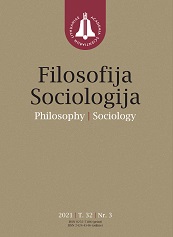Means and Mechanism of the Realization of Linguistic Subjectivity from the Perspective of Philosophical Cognition
Means and Mechanism of the Realization of Linguistic Subjectivity from the Perspective of Philosophical Cognition
Author(s): Bingzhuan PengSubject(s): Epistemology, Aesthetics, Psycholinguistics, Cognitive linguistics, Philosophy of Language
Published by: Lietuvos mokslų akademijos leidykla
Keywords: linguistic subjectivity; philosophical cognition; means and mechanism of realization; cognitive styles; ways of existence;
Summary/Abstract: This study discusses the linguistic subjectivity (LS) phenomenon from the perspective of philosophical cognition. The purpose of this study is to explore the human’s cognitive styles and ways of existence in language and to deepen the understanding of communicative functions of language. An interactive geometric research framework of LS was constructed and the means and mechanism of its realization were explored at six levels: language system level, language use level, propositional meaning level, non-propositional meaning level, speaker’s encoded meaning level and hearer’s decoded meaning level. Also, three dimensions were covered: lexical dimension, syntactic dimension, and discourse dimension. Results show that humans’ cognitive styles and ways of existence encoded in language can be more profoundly dug by exploring LS from the perspective of philosophical cognition. The study can provide a feasible analytical framework for systematically and comprehensively probing of LS phenomenon. Thus, the study facilitates a deeper understanding of LS and communicative functions of language. The study also thoroughly mines subjective factors behind the speaker’s words, utterances or discourse, such as attitudes, emotions and feelings, which also belong to the cognition category, indicating the speaker’s existence in language.
Journal: Filosofija. Sociologija
- Issue Year: 32/2021
- Issue No: 3
- Page Range: 221-230
- Page Count: 10
- Language: English

